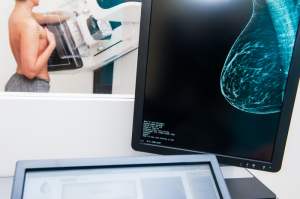New evidence supports mammography screening at age 40
by
Lauren Dubinsky, Senior Reporter | March 20, 2018

Findings to help clinicians and patients
assess pros and cons
A study to be presented at the American Roentgen Ray Society annual meeting at the end of April supports screening mammography starting at age 40.
“We showed the data of our screening population of 50 and over (as USPSTF recommends screening age 50 and over) and then showed how the data changes when we add the screening population 40-49 to the previous group (as ACR and SBI recommend screening at age 40),” Dr. Abid Irshad of the Medical University of South Carolina, told HCB News.
Irshad and his team evaluated over 41,000 screening mammography exams in the areas of callbacks and recall rates, biopsies performed, cancers detected and sensitivity and specificity. The three age groups studied were 40-49, 50-59 and 60-69.
Across all age groups, there were 5,196 callbacks, 1,164 biopsies and 326 cancers detected. Women age 40-49 account for 8,913 mammograms, and had 1,518 callbacks and 306 biopsies, while 52 cancers were detected.
In the 50-59-age group, 13,288 mammograms were performed and there were 1,659 callbacks, 371 biopsies, and 103 cancers detected. The 60-69-age group had 12,119 mammograms, 1,239 callbacks, 302 biopsies and 89 cancers detected.
“What we found was that by including the screening data of the age group 40-49 to the screening data of 50 and above, 19.3 percent additional cancers were found at the expense of an overall 1.5 percent increased callbacks and 0.1 percent increased biopsies,” said Irshad.
The study results showed that there was a larger number of callbacks among women age 40-49 compared to those in the 50-59 and 60-69 age groups. The 40-49 group also had a lower positive biopsy rate compared with women over 50.
However, there was no significant difference in the number of cancers detected in the three groups.
“The purpose of the study is to show that a large number of additional breast cancers can be picked up by starting screening at age 40 at a smaller expense of additional testing and biopsies,” said Irshad. “The study will help clinicians and patients to assess pros and cons of starting early screening.”
|
|
|
You Must Be Logged In To Post A Comment
|
